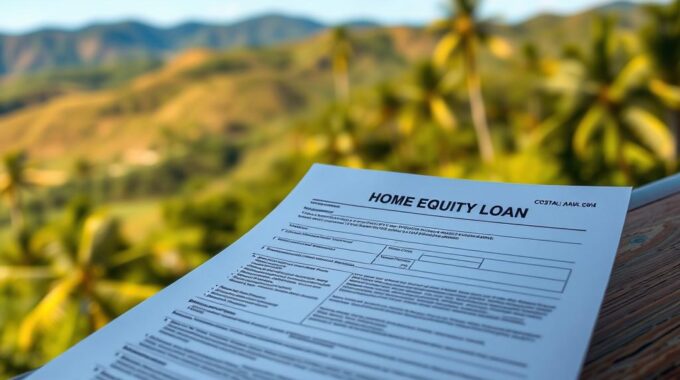Compare home equity loans and reverse mortgages in Costa Rica. Find out which option is best for you with our comprehensive guide, featuring competitive rates and lower fees.

Uncover the Benefits of Foreclosure Refinance GAP Equity
Foreclosure refinance GAP equity can be a valuable solution for homeowners seeking alternatives to foreclosure. This type of refinancing allows homeowners to access the cash value of their home’s equity, providing them with a lump sum that can be used for various purposes, such as home improvements or consolidating debt. By replacing their existing mortgage with a new one for a larger amount, homeowners can take advantage of potentially lower interest rates compared to other forms of financing.
However, it’s important to note that foreclosure refinance GAP equity may come with higher fees and underwriting standards. Home equity loans, another option available to homeowners, allow borrowers to tap into their built-up equity in their homes, either as a lump sum or a line of credit. While home equity loans can offer lower interest rates, there is also the risk of losing your home if you default on payments.
- Foreclosure refinance GAP equity allows homeowners to access the cash value of their home’s equity
- Cash-out refinancing provides a lump sum of cash that can be used for various purposes
- Home equity loans enable homeowners to borrow against the equity they’ve built in their homes
- Choosing the right foreclosure refinance option depends on factors such as equity amount, credit score, and financial goals
- Homeowners should carefully consider the risks and benefits before making a decision
Understanding Foreclosure Refinance GAP Equity
GAP Equity refinance is a specialized form of refinancing designed to provide solutions for homeowners who are facing foreclosure. It offers a lifeline for homeowners by allowing them to tap into the cash value of their home’s equity. With foreclosure looming, homeowners may find themselves in a difficult financial position, but GAP Equity refinance offers a way to access much-needed funds to navigate through this challenging period.
Unlike traditional refinancing options, GAP Equity refinance is specifically tailored to homeowners who are in foreclosure. It takes into account their unique circumstances and aims to bridge the gap between the current value of the home and the outstanding mortgage balance. By refinancing, homeowners can potentially obtain a larger loan amount, enabling them to pay off their existing mortgage, settle any impending foreclosure proceedings, and have access to additional funds for various purposes.
GAP Equity refinance solutions can provide homeowners with the means to consolidate debt, fund home improvements, or cover other essential expenses. By accessing the equity in their homes, homeowners can take advantage of lower interest rates compared to other forms of financing, which can result in significant savings over time. However, it is important for homeowners to consider the associated fees and underwriting standards that may come with GAP Equity refinance.

When considering foreclosure refinance options, homeowners should evaluate their individual financial goals, credit score, and the amount of equity they have in their homes. This will help them choose the most suitable refinance option to bridge the gap in equity and secure their financial stability. Consulting with a qualified lender or financial advisor can provide valuable guidance in making this decision and ensure that homeowners understand the terms and implications of their chosen refinance option.
Summary:
GAP Equity refinance is a specialized form of refinancing designed for homeowners facing foreclosure. It allows homeowners to tap into the cash value of their home’s equity and bridge the gap between the current value of the home and the outstanding mortgage balance. This type of refinance offers homeowners a lifeline by providing them with access to additional funds for various purposes, such as debt consolidation or home improvements. By carefully considering their financial goals, credit score, and equity, homeowners can choose the most suitable refinance option and secure their financial stability.
Accessing Foreclosure Refinance GAP Equity
Homeowners facing foreclosure can access foreclosure refinance GAP equity by meeting certain eligibility criteria and working with specialized lenders. This type of refinancing is specifically designed to help distressed homeowners who need to bridge the gap in equity to avoid foreclosure.
To access foreclosure refinance GAP equity, homeowners need to meet eligibility requirements set by lenders. These requirements may include having a minimum credit score, demonstrating stable income and employment, and having sufficient equity in the property. It is important for homeowners to research and choose lenders who specialize in GAP Equity refinance for foreclosure properties, as they will have the expertise and resources to provide the necessary assistance.
Working with specialized lenders for foreclosure refinance GAP equity can provide homeowners with the guidance and support they need throughout the refinance process. These lenders understand the unique challenges faced by homeowners in distress and can offer tailored solutions to meet their specific needs.
| Lender | Key Features |
|---|---|
| GAP Equity Refinance | Specializes in refinancing options for foreclosure properties |
| Distressed Property Refinance | Offers equity refinance solutions for distressed properties |
| Foreclosure Refinance Experts | Experienced in working with homeowners facing foreclosure |
By accessing foreclosure refinance GAP equity through specialized lenders, homeowners can take advantage of the benefits this type of refinancing offers. It provides an opportunity to tap into the cash value of their home’s equity, potentially saving them from foreclosure and providing financial relief.
Choosing the Right Foreclosure Refinance Option
Choosing the right foreclosure refinance option involves carefully considering how to bridge the GAP in equity and achieve the desired financial outcome. Homeowners facing foreclosure often find themselves in a challenging situation, but exploring refinance options can provide much-needed relief. One option to consider is cash-out refinancing, where homeowners can replace their current mortgage with a new one for a larger amount. This enables them to access the cash value of their home’s equity, which can be used for various purposes such as home improvements or debt consolidation.
When opting for cash-out refinancing, homeowners should keep in mind that it typically comes with lower interest rates compared to other forms of financing. However, it may also involve higher fees and stricter underwriting standards. It’s crucial to carefully evaluate the benefits and potential drawbacks of cash-out refinancing before proceeding.
An alternative option is a home equity loan, which allows homeowners to borrow against the equity they’ve accumulated in their homes. This can be obtained as a lump sum or through a line of credit. Home equity loans often offer lower interest rates, making them an attractive choice for homeowners looking to bridge the GAP in equity. However, it’s important to note that defaulting on payments can put your home at risk.
Ultimately, the decision to choose the right foreclosure refinance option depends on several factors, including the amount of equity you have, your credit score, and your financial goals. It’s essential to carefully weigh the pros and cons of each option and consult with a financial advisor or mortgage professional to make an informed decision.

| Advantages | Disadvantages |
|---|---|
| Access to cash value of home’s equity | Higher fees and underwriting standards |
| Potential for lower interest rates | Risk of losing your home if payments are defaulted |
| Flexibility in using the cash for various purposes |
“Choosing the right foreclosure refinance option involves careful consideration of the financial goals and circumstances of the homeowner.”
Conclusion
Foreclosure refinance GAP equity offers a promising solution for homeowners facing foreclosure, allowing them to access the cash value of their home’s equity and potentially avoid housing insecurities in an unstable market.
Cash-out refinancing is a popular option that enables homeowners to replace their existing mortgage with a new one for a larger amount, providing them with a lump sum of cash. This cash can be utilized for various purposes, such as home improvements or consolidating debt. Although cash-out refinancing may come with higher fees and underwriting standards, it often offers lower interest rates compared to other forms of financing.
Home equity loans provide an alternative approach by allowing homeowners to borrow against the equity they’ve built in their homes. This can be done either as a lump sum or through a line of credit. Home equity loans typically come with lower interest rates but do carry the risk of losing your home if you default on payments.
When considering foreclosure refinance GAP equity options, homeowners should assess their amount of equity, credit score, and financial goals. It’s essential to evaluate the benefits and risks of each option to make an informed decision that aligns with individual circumstances.
FAQ
What is foreclosure refinance GAP equity?
Foreclosure refinance GAP equity is a type of refinancing that allows homeowners facing foreclosure to access the cash value of their home’s equity. It provides homeowners with the opportunity to replace their existing mortgage with a new one for a larger amount, providing them with a lump sum of cash.
How can I use the cash from foreclosure refinance GAP equity?
The cash obtained from foreclosure refinance GAP equity can be used for various purposes, such as home improvements or consolidating debt. It provides homeowners with the flexibility to use the funds in a way that best suits their financial needs.
What are the potential risks involved with foreclosure refinance GAP equity?
While foreclosure refinance GAP equity can offer lower interest rates compared to other forms of financing, it may come with higher fees and underwriting standards. Additionally, there is a risk of losing your home if you default on payments, as the property is used as collateral for the new mortgage.
How do foreclosure refinance options compare to home equity loans?
Foreclosure refinance options and home equity loans both allow homeowners to access the cash value of their home’s equity. Cash-out refinancing offers a lump sum of cash, while home equity loans can be received as a lump sum or through a line of credit. Home equity loans may have lower interest rates, but they also come with the risk of losing your home if you default on payments.
How do I choose the right foreclosure refinance option?
Choosing the right foreclosure refinance option depends on factors such as the amount of equity, credit score, and financial goals of the homeowner. It is important to consider individual circumstances and consult with lenders or financial advisors to make an informed decision.


